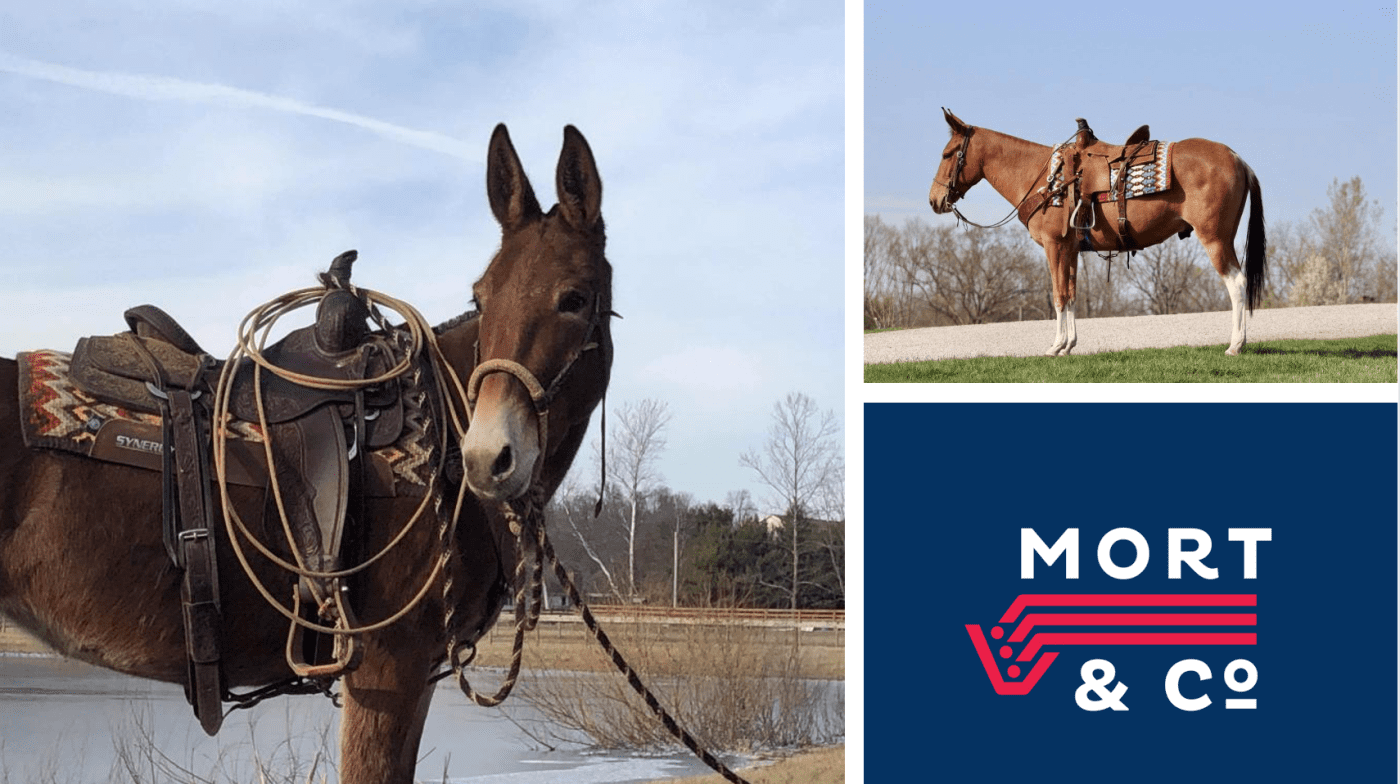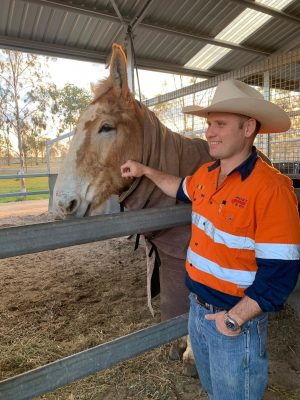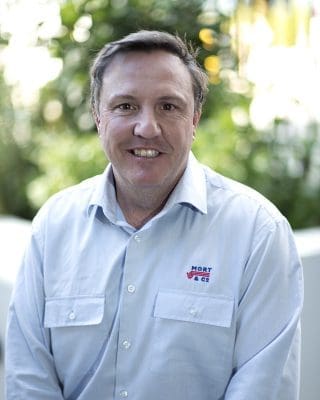
Australia’s largest privately-owned beef cattle lot feeder, Mort & Co, has engaged in a pilot program to investigate the use of mules across their lot feeding operations.
The business has purchased three mules as part of a five-animal pilot program, in what is an unconventional approach to improving safety outcomes for pen riding and cattle movement duties.

Mort & Co Grassdale Feedlot Manager, Marcus Doumany with ‘Radar’, a mule belonging to breeder David Scholl that was trialled at the feedlot site.jpg
Mort & Co Grassdale Feedlot Manager, Marcus Doumany, says the program has been devised to test assumptions surrounding the use of mules in a lot feeding environment and will be deemed successful if it can deliver safer alternatives for the company’s operational personnel.
“Mules are renowned for being very sure of foot, making them ideal for completing tasks in wet and slippery conditions and intensive situations where horses are prone to shy. The purpose of this program is to test these assumptions with the aims of developing a safer alternative to such circumstances, in conjunction with the use of horses.”
So far, the mules Mort & Co have purchased have been sourced from the United States, which Mr Doumany says allows the business to accelerate their research.
“Our mules have been sourced from the US due to the limited availability of saddle bred and trained mule stock in Australia. The animals have been bred by a Mammoth Donkey over suitable horse mares that compliment the donkey with disposition and confirmation. By importing trained and suitable mules, Mort & Co is able to undergo the pilot program in an accelerated manner.”
The three mules landed safely in Australia on the 23rd of June and are currently undergoing 14 days of quarantine before travelling to Mort & Co’s Grassdale Feedlot.
The animals are expected to arrive on the site by July 10.
 Mort & Co General Manager of Operations, Scott Braund, says current research results have been very positive, with plans to continue investigating the benefits of integrating mules into the business.
Mort & Co General Manager of Operations, Scott Braund, says current research results have been very positive, with plans to continue investigating the benefits of integrating mules into the business.
“Our research has focussed on the use of a mules within our livestock operations at both our Pinegrove and Grassdale Feedlots. We believe there is good potential around utilising the mules’ natural characteristics toward mitigating safety hazards within a lot feeding environment. Investigations are promising and we look forward to crystallising our thoughts in the pilot program.”
Mr Braund also commented on the importance of maintaining traditional pen riding methods alongside the use of mules.
“Our interest in mules is not to phase out horses from our operations, but to support our teams with a safer alternative for selected situations. Horses will remain a major aspect of how we undertake daily duties, from cattle movements to monitoring livestock health.”
Mort & Co has also developed a relationship with David Scholl, who recently imported a proven Mammoth Donkey jack from the United States.
Mr Braund says based on the outcomes of the pilot program, Mort & Co has plans to source more mules from the US, as well as through a breeding program with Mr Scholl on his property near Dallarnil, Queensland.
“The success of these trials will enable us to continue our efforts towards improving safety across our sites and with David on board, we will be able breed and train high-quality mules suited specifically to our operations.”
The first foals to be sired by the Mammoth Donkey are due to be born as early as March 2022, following a round of successful artificial inseminations which occurred in April this year.
 Mort & Co CEO, Stephen O’Brien, says the project is a reflection of the company’s forward-thinking nature and unwavering appetite for growth.
Mort & Co CEO, Stephen O’Brien, says the project is a reflection of the company’s forward-thinking nature and unwavering appetite for growth.
“Mort & Co is a world-class agricultural organisation, leveraging innovation to drive growth. The mule project is a prime reflection of the company’s progressive approach towards a safer and more efficient working environment for our teams. I am proud of how the project has developed thus far. It’s a tremendous effort from all involved.”
Future potential for Mort & Co’s research includes offering a solution for less experienced team members to learn pen riding and livestock duties.
The five-animal pilot program will continue, with a fourth mule recently secured and anticipated to arrive in Australia in August 2021.



Mules do not act like horses. I hope that you have trained your riders much better than the mules. The mule will take advantage of the less experienced rider.
Why is it that riding mules are often the subject of derision? It seems that no ‘proper’ horseman would ever be caught dead riding a mule. And why didn’t they ever take off in Australia in the pioneering days, like they did in the US?
It’s a really interesting concept. In Argentina we used to use mules when mustering or checking the really high, rough country where there was a danger of slipping or unsure footing for horses as a mule would flat out refuse to go anywhere it was unsure of, whereas a horse could be coaxed into spots that maybe were unsafe. I guess it will come down to handling and temperament but be prepared to be bitten!
Although I have a slight conflict of interest in suggesting this, there’s a bloke at Mt Isa has a few broken in mules. Certainly sure footed in the rough hills there.